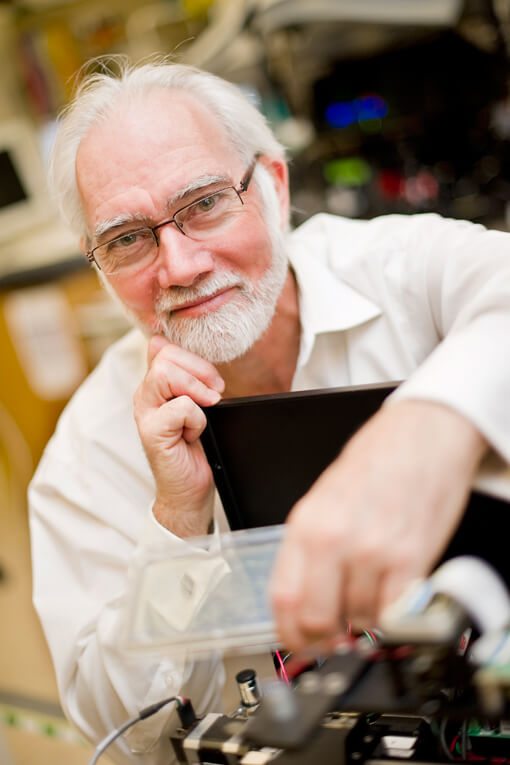Dr. J. Paul Robinson, who holds a joint appointment in the Purdue University College of Veterinary Medicine and the Weldon School of Biomedical Engineering, is one of seven Purdue professors newly elected as fellows of the American Association for the Advancement of Science (AAAS), which is the world’s largest general scientific society. The professors are being honored for their efforts toward advancing science applications that are deemed scientifically or socially distinguished.
Dr. Robinson, the SVM Professor of Cytomics in the Department of Basic Medical Sciences, professor of biomedical engineering, and director of the Purdue University Cytometry Laboratories, is one of three Purdue faculty members elected in the AAAS section on engineering. Dr. Robinson is being recognized for distinguished contributions to the field of advanced cytometric analysis and expanding cellular and microbial detection technologies.

An active researcher with 187 peer reviewed publications and 33 book chapters, Dr. Robinson has edited ten books, given over 150 international lectures, made more than 400 conference presentations, taught advanced courses in over a dozen countries, and has 16 issued patents. His research focus has been on reactive oxygen species primarily in neutrophils and cell lines. His lab is currently concentrating on mitochondrial function, and he also is engaged in developing translational tools for better diagnostics for cervical cancer.
Dr. Robinson’s background is in immunopathology, and he has had a long-term interest in the evaluation of phenotypic analysis of blood cells. He and his team have developed several cell analysis technologies for functional analysis of white blood cells using flow cytometry and various imaging modalities. His lab has significant experience in evaluating phenotypic status of blood samples, particularly the dissection of T cell, B cell, and a variety of other cellular subsets. He also has much experience in sorting cell populations for future cell culturing needs or for additional molecular genetic analysis.
Over the last several years, Dr. Robinson’s research team has expanded its interest in bioengineering with hardware and software groups developing innovative technologies such as: hyperspectral cytometry using multiarray PMTs (currently commercialized by Sony); optical tools for quantitative fluorescence measurement; advanced classification approaches for clinical diagnostics and bacterial classification; and high content, high throughput screening technologies to evaluate drug toxicity.
Dr. Robinson also was an early adopter of web-based educational materials by producing one of the first-known published CDROMs in 1996. He has since published 15 CD-ROMS or DVDs with a total distribution of around 100,000 copies – all distributed free-of-charge.
A past president of the International Society for Advancement of Cytometry, Dr. Robinson is editor-in-chief of Current Protocols in Cytometry, associate editor of Histochemica et Cytobiologica, and associate editor of Cytometry Part A. He was elected to the College of Fellows, American Institute for Medical and Biological Engineering (AIMBE) in 2004, received the Pfizer Award for Innovative Research in 2004, and the Gamma Sigma Delta Research Award of Merit in 2002. Dr. Robinson earned his PhD in immunopathology from the University of New South Wales in Sydney, Australia and completed a postdoctoral fellowship at the University of Michigan.
Election as an AAAS fellow is a lifetime honor bestowed upon AAAS members by their peers. This year, 489 members have been awarded this distinction. In addition to the Purdue professors elected as fellows in the AAAS section on engineering, three Purdue faculty members were elected as fellows in the section on biological sciences and one was elected in the section on physics. The 2020 fellows were announced Friday, November 27 in the AAAS News and Notes section of the journal Science. A virtual induction ceremony for the new fellows will be held February 13 during the annual Fellows Forum.
The tradition of selecting fellows began in 1874. Members can be considered for the rank of fellow if nominated by the steering group of their respective sections, by three fellows or by the association’s chief executive officer. Each steering group then reviews nominations within its respective section and forwards a final list to the association’s council. The nomination involves all disciplines of science and engineering, which makes it broader than any technical society.
Click here to view a news release with the complete list of Purdue faculty members elected as 2020 AAAS fellows.
